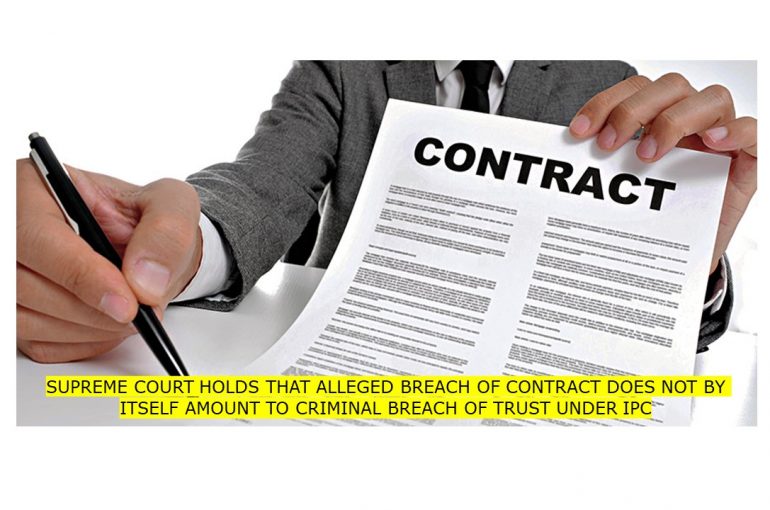SUPREME COURT HOLDS THAT ALLEGED BREACH OF CONTRACT DOES NOT BY ITSELF AMOUNT TO CRIMINAL BREACH OF TRUST UNDER IPC
In a recent Criminal Appeal, a two Judge Bench of the Supreme Court comprising of Justice D.Y. Chandrachud and Justice A.S. Bopanna passed a Judgement dated 18.08.2022 in ‘M N G Bharateesh Reddy vs Ramesh Ranganathan, Criminal Appeal No 1273 of 2022’ and set aside the Judgement dated 12.07.2019 (Impugned Order) passed by the High Court of Karnataka and held that an alleged breach of the contractual terms does not ipso facto constitute the offence of the criminal breach of trust under the Indian Penal Code, 1860 (IPC).
In this case, the first Respondent (Respondent No.1) was employed by BGS Apollo Hospital, Mysore, as a Consultant Neurosurgeon. The Respondent No. 2 worked in such capacity from March 2004 to June 2014. A Consultancy Agreement was entered into between the Respondent No.2 and the Hospital on 01.04.2013 (Agreement) containing the terms of engagement. One of the terms of the engagement was that either Party may terminate the Agreement, with or without cause, by giving a prior notice of thirty days. On 03.06.2013, the Hospital Management enhanced the emoluments of Respondent No.1.
Thereafter, differences arose between the Respondent No. 1 and the Hospital Management. The Respondent No. 1 wrote a Letter dated 09.01.2014 to the Appellant alleging that patients referred to him were being diverted to other doctors of the Hospital. The services of the Respondent No. 1 were terminated on 30.05.2014 for inconsistent and unsatisfactory behaviour in terms of the Consultancy Agreement. The Respondent No. 1 furnished a Representation on 31.05.2014 to the Managing Director, Apollo Group of Medical Sciences highlighting gross irregularities in the billing of patients. In this Representation, he also alleged that the Appellant had been threatening and maligning him.
On 10.10.2014, the Respondent No. 1 filed a Complaint under Sections 200 (Examination of complainant) of the Code of Criminal Procedure 1973, (CrPC), before the First Additional Civil Judge, Mysore and Judicial Magistrate First Class, Mysore (JMFC). In his Complaint, the Respondent No.1 alleged that the Appellant misused its authority and terminated his services with an oblique and ulterior motive of defaming him. The JMFC by an Order dated 03.03.2015 took cognizance under various provisions of the IPC. The Order of the JMFC was challenged before the Additional Sessions Judge, Mysore. The Additional Sessions Judge by an Order dated 16.12.2015 set aside the Order of the JMFC on the ground that the Complaint did not disclose the ingredients of the offences of defamation or cheating.
The Respondent No. 1 aggrieved by this Order dated 16.12.2015 of Additional Sessions Judge, filed an Appeal before the High Court of Karnataka. The Single Judge by an Order dated 12.07.2019 held that no case was made out against the Appellant under Sections 499 (Defamation) and 500 (Punishment for defamation) of the IPC. However, the High Court held that the material placed on record prima facie disclosed ingredients of offences under Sections 405 (Criminal breach of trust) and 420 (Cheating and dishonestly inducing delivery of property) of the IPC.
An Appeal was filed by the Appellant before the Supreme Court against the Order of the High Court dated 12.07.2019. The Apex Court considered Sections 415 and 420 of IPC and observed that, “The ingredients of the offence under Sections 415 emerge from a textual reading. Firstly, to constitute cheating, a person must deceive another. Secondly, by doing so the former must induce the person so deceived to (i) deliver any property to any person; or (ii) to consent that any person shall retain any property; or (iii) intentionally induce the person so deceived to do or omit to do anything which he would not do or omit if he were not so deceived and such an act or omission must cause or be likely to cause damage or harm to that person in body, mind, reputation or property. Sections 420 deals with cheating and dishonestly inducing delivery of property.”
The Supreme Court relied on the Judgement in the case of ‘Hridaya Ranjan Prasad Verma v. State of Bihar, (2000) 4 SCC 168’ a two-Judge Bench of where the Bench interpreted Sections 415 and 420 of IPC to hold that fraudulent or dishonest intention is a precondition to constitute the offence of cheating. The Apex Court held that, “The grievance of the Respondent No. 1 arises from the termination of his services at the Hospital. The allegations indicate that there was an improper billing in respect of the surgical services which were rendered by the complainant at the Hospital. At the most, the allegations allude to a breach of terms of the Consultancy Agreement by the Appellant, which is essentially in the nature of a civil dispute.”
Further, the Supreme Court considered Section 405 of IPC and held that, “None of the ingredients of the offence of criminal breach of trust have been demonstrated on the allegations in the complaint as they stand. The first respondent alleges that the Appellant caused breach of trust by issuing grossly irregular bills, which adversely affected his professional fees. However, an alleged breach of the contractual terms does not ipso facto constitute the offence of the criminal breach of trust without there being a clear case of entrustment.”
Accordingly, the Apex Court held that the offence of cheating or criminal breach of trust was not made out against the Appellant-Hospital Management and thus, the Supreme Court set aside the Order dated 12.07.2019 passed by the High Court and restored the Order dated 16.12.2015 passed by the Additional Sessions Judge.
Anuradha Kumari
Associate
The Indian Lawyer & Allied Services
Edited by
Sushila Ram Varma
Chief Consultant and Editor
The Indian Lawyer & Allied Services





































Leave a Reply